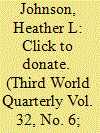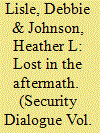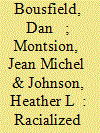|
|
|
Sort Order |
|
|
|
Items / Page
|
|
|
|
|
|
|
| Srl | Item |
| 1 |
ID:
106662


|
|
|
|
|
| Publication |
2011.
|
| Summary/Abstract |
This article investigates the role of visual representation through images in the international refugee regime, with a particular focus on the female refugee. I argue that visual representation illustrated by the photo archives of the unhcr in particular, but also in other institutional sources, plays a crucial role in shaping our imaginations and knowledges, and that its dynamics are important in understanding the politics of asylum. As the international refugee regime institutionalised by the unhcr has developed, the imagination of the refugee has undergone three concurrent shifts: racialisation, victimisation and feminisation. Each of these shifts has contributed to changing policies and practices in the regime, particularly the change in 'preferred solution' from integration to repatriation or, where possible, prevention. More importantly, these shifts have all operated within a discourse of depoliticisation of the refugee, denying the figure of the refugee the capacity for political agency. This depoliticisation works through the construction of the 'female' refugee, indicating important lessons for our understandings of the political agency of both women and non-citizens.
|
|
|
|
|
|
|
|
|
|
|
|
|
|
|
|
| 2 |
ID:
164284


|
|
|
|
|
| Summary/Abstract |
What happens when violence disappears? What is left in the backwash of crisis? Who attends to the emotional, material and ideational detritus of closing borders? Like many, we are working in the aftermath of the recent and deadly intensification of EU migration. We contest the widespread account that the ‘crisis’ is now over – that policymakers have effectively ‘solved’ the problem of migration by gathering undocumented subjects into infrastructures of containment. We focus instead on the painful traces of EU migration that continue to be produced by global structures of citizen/alien, legal/illegal, friend/enemy. We do not produce a comprehensive diagnosis, normative argument or critical framework. Instead, we rest awhile in the aftermath of the crisis – specifically on the Greek island of Kos – to think about questions of abandonment, erasure and displacement. This is a visual essay representing a conversation between two researchers as they interact with the aftermath of the refugee crisis on Kos. Reflecting on select images from September 2016, we present a dialogue that directly speaks to a core theme each image raises. In doing so, we question some of the basic assumptions about how to do critical analysis on migration, security and borders, and therefore seek to disrupt dominant modes of academic writing as well as the practice of research itself.
|
|
|
|
|
|
|
|
|
|
|
|
|
|
|
|
| 3 |
ID:
150569


|
|
|
|
|
| Summary/Abstract |
This paper interrogates the emerging practices of narrative methods in research that focuses on mobility and migration. It seeks to understand how these methods enable a conceptualization of global politics that challenges the global/local divide, revealing instead complex entanglements through which the local and the global are mutually constituted. Focusing in particular on the primacy of narrative, and on the concept of “translation,” the paper argues that participants in research author narratives in ways that reveal alternative, powerful accounts of global politics that are meaning-making and demand an understanding of “local” knowledges as valid and important insights into how global politics is understood. Ultimately, these methods engage the heterogeneous, multiple, and ultimately fully relational narratives of individuals who are autonomous and creative, and the ways these accounts interrupt the dominant narratives of how the world is politically understood—and is politically practiced.
|
|
|
|
|
|
|
|
|
|
|
|
|
|
|
|
| 4 |
ID:
124442


|
|
|
|
|
| Publication |
2013.
|
| Summary/Abstract |
This article explores the dynamics of the space of exception at the borders of Europe in the Spanish enclave of Melilla, and the neighboring Moroccan city of Oujda. Building upon field research conducted in the spring of 2008, I ask how we can understand the political space of migration not simply as exceptional, but as shaped by the mobility of the irregular migrants moving outside of the frameworks, policies, and practices of the state. By privileging the migrant narrative and making use of Rancière's conception of politics as shaped by the demands of those who "have no part," I suggest an alternative way of understanding the politics of exception and agency of non-citizens-that is, one of disruption and demands to open up powerful potentials for change in an otherwise rigid regime.
|
|
|
|
|
|
|
|
|
|
|
|
|
|
|
|
| 5 |
ID:
165255


|
|
|
|
|
| Summary/Abstract |
International relations (IR) is traditionally taught from a detached standpoint, as the international realm is conceptualized as distinct from normative, emotional, and embodied realities. We challenge this abstraction and focus on emotions to examine the intersection of race and international relations in how we teach and how students learn. Focusing on emotional labor, we maintain that students are taught and learn about the presence and absence of race in the discipline in specific ways. As teachers and affective leaders, we manage student emotions at the intersections of race and international relations, including when to make these feelings visible and how to connect them to racialized narratives. After a brief review of recent critical scholarship on race in the discipline, we present a conversation in which we highlight our own affective leadership, emotional labor, and pedagogical strategies in the international relations classroom, as they pertain to engaging with issues of race and racism.
|
|
|
|
|
|
|
|
|
|
|
|
|
|
|
|
|
|
|
|
|